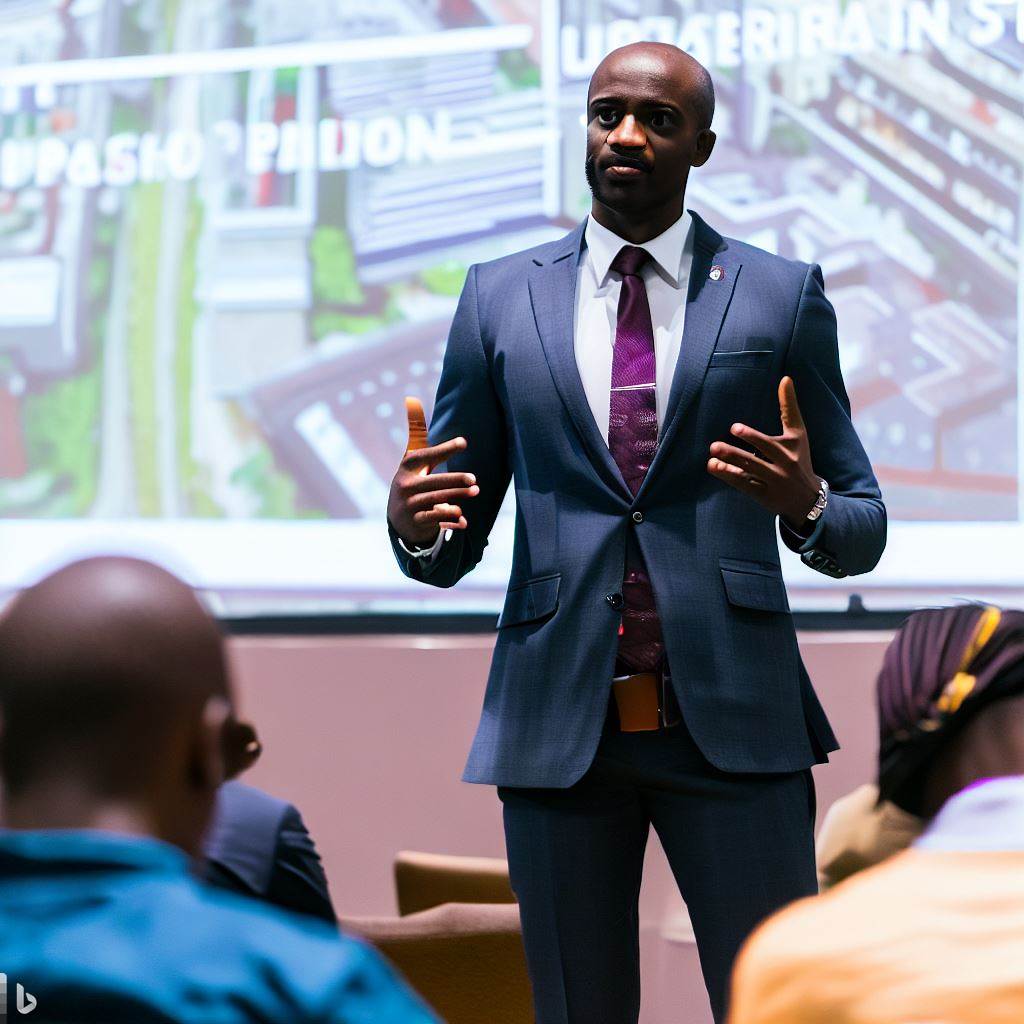Introduction
Let’s explore the influence of urban planners on Nigeria’s cityscape.
Urban planning in Nigeria plays a crucial role in shaping the cities and towns of the country.
It involves the design and development of urban areas, ensuring that they are functional, sustainable, and aesthetically pleasing.
Urban planners are professionals who are responsible for creating plans and strategies to guide the growth and development of cities.
Examining the influence of urban planners on Nigeria’s cityscape is imperative because it allows us to understand the significant impact they have on shaping the country’s urban environment.
Their decisions and actions can shape the quality of life for millions of Nigerians.
Urban planners have a significant impact on shaping Nigeria’s cityscape, and understanding their influence is crucial for designing sustainable and thriving cities in the country.
Historical Perspective of Urban Planning in Nigeria
A. Overview of the pre-colonial urban planning practices
The pre-colonial era in Nigeria saw the emergence of well-organized urban settlements. Indigenous communities practiced traditional urban planning, focusing on functionality and social cohesion.
Urban centers were designed to meet the needs of the population, with structured layouts.
Planners considered factors like natural resources, agricultural productivity, and defense during the planning process.
The cities were often centered around a market square or a significant landmark. Urban planners in the pre-colonial era aimed to create inclusive and sustainable cities.
B. Influence of colonialism on urban planning in Nigeria
Colonial rule significantly impacted urban planning in Nigeria, introducing new ideologies and practices.
The British colonial administration implemented urban planning strategies to serve their interests.
Urban areas were transformed to facilitate the extraction of resources and control the local population. Colonial urban planning focused on segregating communities based on race and class.
The construction of railways and roads facilitated resource extraction and trade, disrupting traditional urban layouts. The influence of colonialism led to the neglect of indigenous urban planning practices.
C. Post-independence efforts and urban planning initiatives
After gaining independence in 1960, Nigeria aimed to develop modern and sustainable cities.
The government established agencies and departments to manage urban planning and development.
National development plans included urban planning as a crucial component for economic growth.
The focus shifted towards accommodating the rapidly growing urban population and improving infrastructure.
Urban planners emphasized strategic land use, transportation, housing, and environmental sustainability.
The challenges of rapid urbanization and inadequate resources posed obstacles to effective urban planning.
Efforts were made to incorporate community participation and engage stakeholders in the planning process.
In short, the historical perspective of urban planning in Nigeria reveals the impact of both indigenous practices and colonialism.
Pre-colonial urban planners focused on functionality, social cohesion, and sustainability.
However, colonialism introduced new ideologies that prioritized the interests of the colonial rulers, resulting in segregated and resource-oriented urban planning.
Post-independence efforts have aimed to develop modern and sustainable cities, but challenges of rapid urbanization and limited resources persist.
Nonetheless, the recognition of community participation and stakeholder engagement is key to overcoming these challenges and shaping Nigeria’s cityscape for the better.
Read: Exploring the Top Urban Planning Projects in Nigeria
The Role of Urban Planners in Nigeria
A. Definition and responsibilities of urban planners
Urban planners are professionals who analyze, design, and guide the development of cities.
They create plans to ensure that cities are efficient, functional, and sustainable.
Urban planners are responsible for managing land use, transportation, and infrastructure development.
They consider social, economic, and environmental factors to make cities livable and attractive.
B. Importance of urban planners in addressing urban development challenges
- Urban planners play a crucial role in addressing Nigeria’s urban development challenges.
- Rapid urbanization in Nigeria has led to overcrowding, infrastructure deficits, and environmental degradation.
- Urban planners help mitigate these challenges by creating comprehensive and sustainable city plans.
- They ensure proper allocation of resources, efficient transportation systems, and adequate housing.
- Urban planners promote social inclusion, economic growth, and environmental preservation in cities.
C. Key stakeholders involved in urban planning in Nigeria
- Government agencies: Federal, state, and local governments formulate urban planning policies and regulations.
- Urban Development Boards: These agencies oversee and coordinate urban planning activities in specific regions.
- Community leaders: Local chiefs, traditional rulers, and community associations provide valuable insights into the needs and aspirations of communities.
- Civil society organizations: NGOs and community-based organizations advocate for citizen participation and environmental sustainability.
- Private developers: Real estate developers and investors play a significant role in implementing urban plans.
- Academic institutions: Universities and research centers contribute to urban planning knowledge and provide trained professionals.
- Residents: Citizens actively participate in urban planning processes through public consultations and feedback mechanisms.
In fact, urban planners in Nigeria hold a vital role in shaping the country’s cityscape. They analyze, design, and guide the development of cities to ensure functionality, efficiency, and sustainability.
Their responsibilities encompass land use management, infrastructure development, and transportation planning.
Urban planners are crucial in addressing the urban development challenges faced by Nigeria, such as rapid urbanization, overcrowding, and infrastructure deficits.
By involving key stakeholders, including government agencies, community leaders, and residents, urban planners work towards creating inclusive, economically viable, and environmentally friendly cities.
The influence of urban planners is profound, as their visionary ideas and expertise shape the present and future of Nigeria’s urban landscapes.
Read: Education and Skills Needed for Urban Planning in Nigeria
Factors Impacting Nigeria’s Cityscape
A. Population growth and urbanization trends
The rapid increase in population and urbanization has heavily impacted Nigeria’s cityscape.
As more people migrate from rural to urban areas in search of better opportunities, the pressure on urban planners to accommodate this growth becomes immense.
The population growth rate in Nigeria has been consistently high, with an annual increase of about 2.6%.
This rapid growth has resulted in the expansion of cities and the emergence of new urban centers.
Consequently, urban planners have had to develop strategies to manage this growth and ensure sustainable development.
Urbanization trends have also played a significant role in shaping Nigeria’s cityscape. As more people move to cities, there is a demand for housing, transportation, and other urban amenities.
Urban planners must consider these demands when designing and developing urban areas.
Failure to do so can result in overcrowding, inadequate infrastructure, and slum-like conditions.
B. Economic factors influencing urban development
Economic factors have a profound influence on Nigeria’s cityscape.
The country’s economic growth and development directly impact the shape and form of its urban areas.
Cities are often centers of economic activities, attracting businesses, industries, and investments.
Urban planners must consider economic factors when designing and developing cities.
They need to create environments that are conducive to business and investment.
This includes providing infrastructure, such as transportation networks, industrial zones, and commercial areas.
Additionally, the availability of job opportunities and income disparities can influence the distribution of population within urban areas.
Urban planners need to ensure that cities provide equal access to economic opportunities and services for all residents.
C. Political and governance factors shaping the cityscape
Political and governance factors play a crucial role in shaping Nigeria’s cityscape.
The decisions made by policymakers and government officials directly impact urban planning and development.
Government policies, regulations, and legislation can either facilitate or hinder urban development.
Effective governance ensures that urban planners have the necessary tools and resources to carry out their work.
It also provides a framework for collaboration between different government agencies involved in urban development.
Political stability is another important factor. Stable political environments promote long-term planning and investment in urban areas.
Unstable political situations can lead to inconsistent policies and hinder the implementation of urban development plans.
Furthermore, corruption and bureaucratic inefficiencies can hinder the effective functioning of urban planning processes.
Transparency, accountability, and good governance practices are essential for successful urban development in Nigeria.
In essence, several factors impact Nigeria’s cityscape, including population growth and urbanization trends, economic factors, and political and governance considerations.
Urban planners play a crucial role in managing these factors to ensure sustainable and inclusive urban development.
By understanding the complexities of these influences, planners can design cities that meet the needs of their residents and contribute to the overall development of the country.
Read: Demand and Job Prospects for Urban Planners in Nigeria

Influence of Urban Planners on Nigeria’s Cityscape
A. Planning and designing functional urban spaces
Urban planners play a crucial role in Nigeria’s cityscape by creating well-designed and functional urban spaces.
They assess the needs and demands of the population and develop comprehensive plans that cater to them.
They consider factors such as population density, accessibility, and infrastructure availability when designing urban spaces.
Their aim is to create efficient and sustainable cities that promote economic growth and a high quality of life.
They collaborate with architects, engineers, and other professionals to ensure that the urban spaces are well-designed.
Urban planners also ensure that cities have a mix of residential, commercial, and recreational areas to cater to different needs.
Through their expertise, Nigeria’s cities are able to provide the necessary amenities and services for its residents.
B. Promoting sustainable development and environmental preservation
Urban planners in Nigeria also focus on promoting sustainable development and preserving the environment.
They incorporate environmentally-friendly practices into their plans to minimize the impact on natural resources.
They prioritize the use of renewable energy sources and promote energy-efficient buildings and infrastructure.
Urban planners also work towards reducing pollution and promoting waste management strategies.
They encourage the use of public transportation and plan for efficient transportation networks to reduce traffic congestion and air pollution.
By integrating green spaces, such as parks and gardens, into urban plans, they enhance the overall aesthetics and improve air quality.
Their efforts in promoting sustainability and environmental preservation contribute to a healthier and more livable cityscape.
C. Enhancing social equity and community engagement
Urban planners acknowledge the importance of social equity and community engagement in Nigeria’s cityscape.
They strive to create inclusive urban spaces that cater to the needs of diverse communities and promote social cohesion.
They actively engage with residents, community organizations, and stakeholders to understand their needs and preferences.
Through public consultations and participation, they ensure that the planning process is transparent and reflective of community aspirations.
Urban planners also work towards reducing socio-economic disparities by providing equal access to services and amenities.
They design urban spaces that foster social interactions, such as community centers and public gathering spaces, to promote community engagement.
Their focus on social equity and community engagement contributes to more inclusive and cohesive cities in Nigeria.
D. Managing transportation and infrastructure systems
Urban planners are responsible for managing transportation and infrastructure systems in Nigeria’s cities.
They analyze traffic patterns, assess transportation needs, and plan for efficient and sustainable transportation networks.
They design road networks, public transportation systems, and pedestrian-friendly infrastructure to ensure smooth mobility.
Urban planners also consider the implementation of smart technology to improve traffic flow and reduce commuting time.
They work closely with government agencies, engineers, and transportation experts to ensure safe and reliable transportation systems.
By managing transportation and infrastructure, urban planners contribute to reducing congestion, improving accessibility, and enhancing the overall quality of life in Nigeria’s cities.
In general, the influence of urban planners on Nigeria’s cityscape is significant and multifaceted.
From the planning and design of functional urban spaces to promoting sustainability and environmental preservation.
Urban planners play a crucial role in creating livable, inclusive, and well-connected cities.
Their efforts in enhancing social equity and community engagement contribute to a sense of belonging and unity among residents.
By managing transportation and infrastructure systems, they ensure efficient mobility and accessibility for all.
Basically, urban planners shape the physical and social fabric of Nigeria’s cities, making them vibrant and sustainable places to live.
Read: Understanding the Roles of Urban Planners in Nigeria
Case Studies of Urban Planning Projects in Nigeria
A. Lagos: Transforming a Megacity through Urban Planning
Lagos, Nigeria’s largest city, has experienced rapid urbanization and population growth.
Urban planners in Lagos have implemented various projects to address the city’s development challenges.
One successful project is the Bus Rapid Transit (BRT) system, which has improved transport efficiency.
The Eko Atlantic City, a man-made island, is another notable urban planning project in Lagos.
The development aims to create a modern, resilient, and sustainable city on the coastline.
Urban planners also focus on upgrading informal settlements to improve living conditions for residents.
The Lagos State Urban Renewal Agency (LASURA) plays a significant role in these initiatives.
Above all, urban planning projects in Lagos have contributed to the city’s transformation and economic growth.
B. Abuja: The Planned Capital City of Nigeria
Abuja, Nigeria’s capital city, was carefully planned and designed by urban planners.
The city’s master plan prioritizes functional zoning, green spaces, and efficient movement patterns.
Landmark buildings like the National Assembly Complex and Nigerian Presidential Complex reflect the city’s planning.
Abuja’s road network and transportation system strive to alleviate traffic congestion.
The Abuja Light Rail, launched in 2018, is a major urban planning achievement in improving transportation.
Urban planners in Abuja aim to create a sustainable and livable capital city for Nigerians.
C. Challenges and Successes in Other Nigerian Cities
Other Nigerian cities face similar challenges of rapid urbanization and inadequate infrastructure.
Urban planners have made efforts to address these challenges in cities like Kano and Port Harcourt.
In Kano, urban planning projects focus on improving road networks and drainage systems.
Port Harcourt’s urban planners have prioritized flood control measures due to heavy rainfall.
However, budget limitations, corruption, and lack of enforcement pose challenges to urban planning efforts.
Collaboration between government agencies, urban planners, and communities is crucial for success.
In summary, urban planners in Nigeria play a crucial role in shaping the country’s cityscapes.
Through case studies of cities like Lagos and Abuja, it is evident that urban planning projects contribute to economic growth, improved infrastructure, and enhanced quality of life.
Challenges exist, but with proper collaboration and commitment, Nigeria’s cities can continue to evolve into sustainable and livable urban centers.
Despite challenges, urban planning projects have brought positive changes to Nigerian cities.
Lagos and Abuja serve as examples of successful transformations through effective urban planning.
Read: Dissecting The Architect Registration Council of Nigeria
Gain More Insights: Analyzing The Role of an Architect in Nigeria’s Real Estate
Criticisms and Limitations of Urban Planning in Nigeria
A. Lack of proper implementation and enforcement of urban plans
Many urban planning projects in Nigeria suffer from a lack of effective implementation. The failure to enforce urban plans results in haphazard development and unplanned urban sprawl.
Corruption and bureaucratic red tape often hinder the proper execution of urban planning initiatives.
Without proper implementation and enforcement, the intended benefits of urban planning cannot be achieved.
Municipal authorities must prioritize the enforcement of urban plans to ensure sustainable development.
B. Insufficient funding and resources for urban planning projects
One significant limitation of urban planning in Nigeria is the lack of adequate funding.
Insufficient financial resources impede the execution of comprehensive urban planning initiatives.
Without proper funding, urban planners are unable to implement infrastructure projects and improvement plans.
Urban planners often face challenges in securing funds for long-term planning and development projects.
Government and private sector must invest more in urban planning to overcome the resource constraints.
C. Social and cultural factors influencing the effectiveness of urban planning
The unique social and cultural dynamics of Nigeria influence the effectiveness of urban planning.
Traditional beliefs and practices may conflict with modern planning principles and guidelines.
Resistance to change and reluctance to abandon traditional practices hinder effective urban planning.
Social inequalities and differing needs of various population groups further complicate urban planning efforts.
Urban planners need to consider social and cultural factors to ensure plans are relevant and inclusive.
The criticisms and limitations of urban planning in Nigeria highlight the need for improvement and reform in the field.
Proper implementation and enforcement of urban plans are crucial for managing urban growth and preventing chaotic development.
This requires addressing issues of corruption and bureaucratic inefficiency.
Additionally, adequate funding and resources should be allocated to urban planning projects to ensure their successful execution.
Finally, taking into account social and cultural factors is essential to create urban plans that meet the diverse needs of Nigeria’s population.
Overcoming these limitations will contribute to the development of sustainable and livable cities in Nigeria.
You Might Also Like: Addressing Housing Crisis through Architecture in Nigeria
Recommendations for Improving Urban Planning in Nigeria
Strengthening collaboration between urban planners and other stakeholders
- Create platforms for regular meetings and discussions between urban planners, government officials, community leaders, and other relevant stakeholders.
- Encourage information sharing and joint decision-making to ensure different perspectives are considered.
- Establish partnerships with academic institutions, NGOs, and private sector organizations to leverage their expertise and resources.
Enhancing public participation and community engagement in the planning process
- Develop mechanisms for soliciting input from the public, including open forums, surveys, and online platforms for feedback.
- Organize community workshops and consultations to educate residents about urban planning and gather their input on local issues.
- Promote transparency and accountability by sharing information about planning projects, decisions, and outcomes with the public.
Policy reforms to address funding and resource challenges
- Advocate for increased government investment in urban planning, recognizing its long-term benefits for sustainable development.
- Develop strategies to attract private sector investment in urban development projects through incentives and partnerships.
- Explore alternative financing mechanisms such as public-private partnerships, community development funds, and international development aid.
Continuous professional development and capacity building for urban planners
- Provide opportunities for urban planners to enhance their skills and knowledge through workshops, conferences, and training programs.
- Encourage urban planners to pursue professional certifications and memberships in relevant associations to stay up-to-date on best practices.
- Support mentorship programs between experienced planners and younger professionals to foster knowledge transfer and skill development.
Conclusion
Throughout this blog section, we have explored the significant influence of urban planners on Nigeria’s cityscape.
The role of urban planners cannot be overstated as they contribute to the development and organization of cities, ensuring efficient and sustainable growth.
The decisions made by urban planners impact the layout, infrastructure, and overall livability of Nigeria’s cities.
It is crucial for Nigeria to continue investing in urban planning to achieve sustainable development.
By prioritizing urban planning, the country can address issues such as rapid urbanization, inadequate infrastructure, and environmental degradation, leading to the creation of cities that are conducive to economic growth, social well-being, and environmental sustainability.
Looking ahead, the future of urban planning in Nigeria holds immense potential.
With the right policies, funding, and collaboration between government bodies, urban planners, and citizens, Nigeria’s cities can become vibrant, inclusive, and sustainable hubs.
The integration of technology, innovative design, and community participation will play a crucial role in shaping the future of urban planning in Nigeria.
Urban planners play a vital role in shaping Nigeria’s cityscape by designing efficient and sustainable cities.
Continued investment in urban planning is essential for Nigeria’s sustainable development.
By embracing the challenges and opportunities that lie ahead, Nigeria can create cities that are livable, economically prosperous, and environmentally resilient.
Together, let us embark on a journey towards a brighter future for urban planning in Nigeria.




